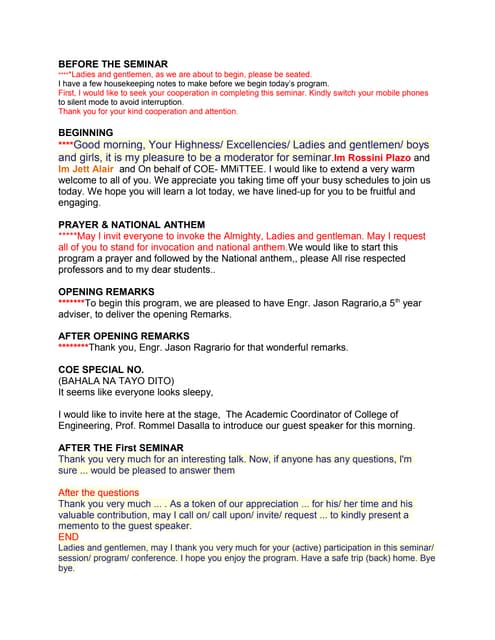Master Of Ceremonies Script Sample
Share • LinkedIn • Facebook • Twitter 2 Are you going to be a master of ceremony at a conference, awards night, product launch, seminar series, concert, wedding or similar event? What a wonderful honour, but a daunting one! Saint seiya english dubbed. It isn't always as easy as it seems. There are a lot of duties involved and a great number of practical aspects to pay attention to. You are not just there to boost your ego, watch the clock, or to give announcements.
You are there to help the audience feel engaged with, and feel informed about, everything that is happening. How brilliant are you? Your career could be influenced by your success or failure in an MC role. Here are 5 tips to help you be a brilliant MC. MC tip 1: Know your role It is the prime responsibility of the master of ceremonies to: • Keep the event flowing. • Keep the energy and enthusiasm of the audience high. • Help the audience feel welcomed.
Emcee Script Template

• Help the speakers feel appreciated.  • Help the sponsors feel proud to be involved. • Smooth over problems that arise so people don't know or don't worry. • Keep the event to time no matter what happens.
• Help the sponsors feel proud to be involved. • Smooth over problems that arise so people don't know or don't worry. • Keep the event to time no matter what happens.

Master Of Ceremony Template
Are you going to be a master of ceremony at a conference, awards night, product launch, seminar series, concert, wedding or similar event? How to be a brilliant master of ceremony Published on. EMCEE SCRIPT TIP 6: TELL THEM WHY YOUR EVENT IS SPECIAL. Special events should be just that: special. Part of giving your event that extra shine is helping audience members understand the deeper contextual meaning of your event. For example, let’s say you’re serving as master of ceremonies for an awards banquet.
• Ensure everyone knows what is happening. • Do whatever is possible to help the organiser make it a great event.
Example Master Of Ceremonies Script
And this is only part of it. MC tip 2: Welcome the core groups Help the audience to feel welcomed. Identify the core groups in your audience and welcome each one. It isn't sufficient just to say, 'Welcome to you all.' It is not a genuine, heartfelt welcome.Instead, welcome specific individuals and specific groups, not just by title but with relevant information. For example, you might say, 'To those of you who've travelled all the way from Newcastle and fought your way through the fog, a big welcome'.